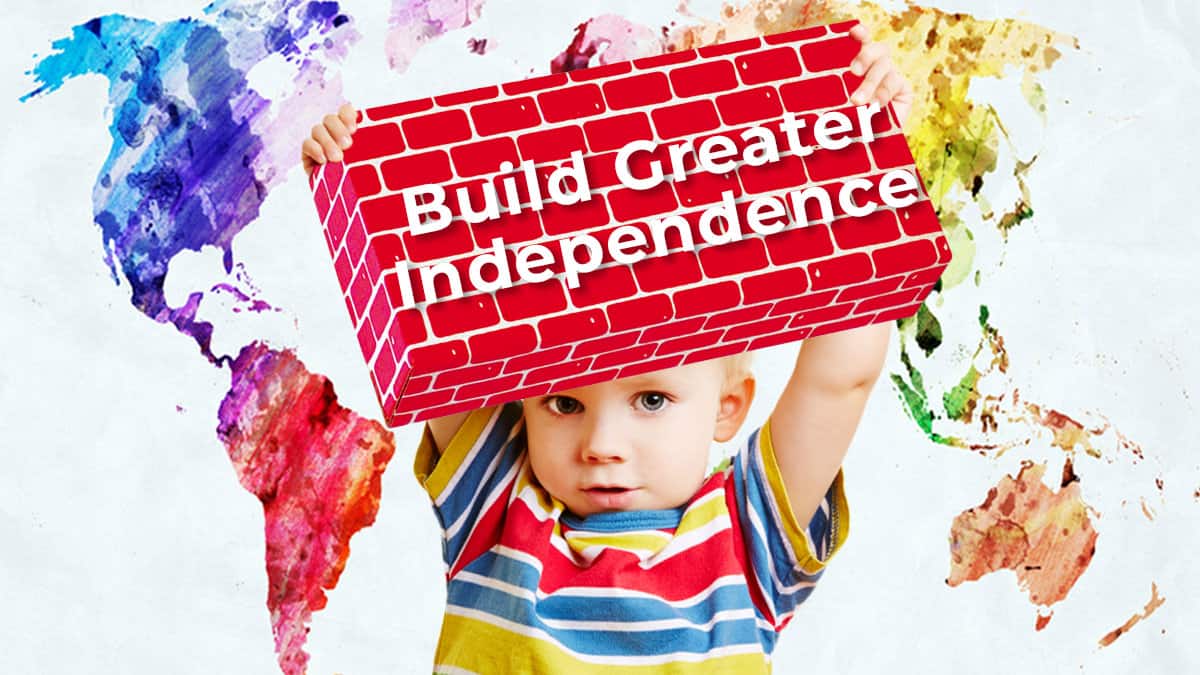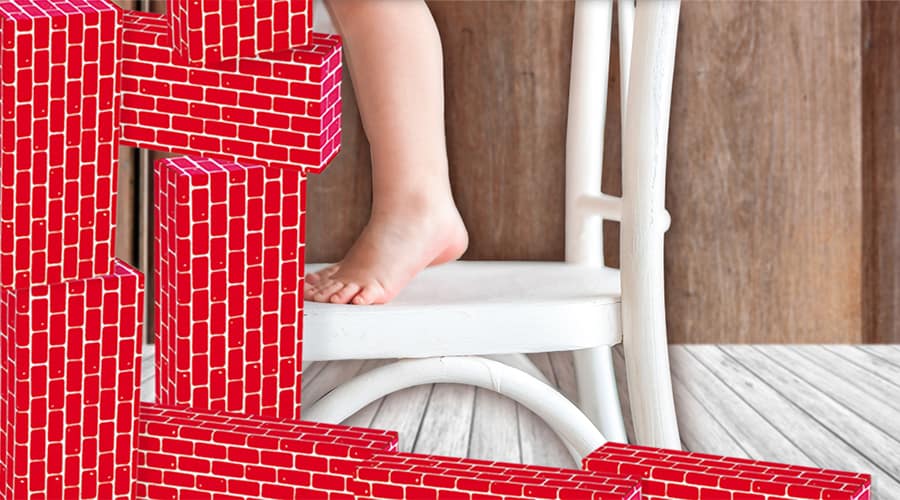Are you wondering how to boost your toddler’s gross motor development? We’ve got you covered!
Navigating early childhood development comes with excitement and challenges, especially when building essential skills like gross motor coordination.
Did you know that gaining control of gross motor skills fosters self-confidence and greater independence?
We’re here to share insights into gross motor development, offering practical tips to nurture your toddler’s independence and confidence.
Ready? Join us as we explore your toddler’s gross motor development.

What Are Gross Motor Skills?
Motor skills are when the brain and muscles work together to carry out a planned motion. They include two distinct groups: gross (large muscles) and fine (small muscles). Each type depends on the other for coordination development.
Gross motor development will be the focus of this article. Motor skills involve the movements and actions of the muscles. That means gross motor movements include the coordination of large body parts — for example, the legs, arms, and torso.
Gross motor development includes three subgroups: object control skills, stationary skills, and locomotor skills.
- Object control skills (manipulation) involve rolling, kicking, lifting, throwing, or catching.
- Stationary skills include movement in place, such as balancing, swinging, pulling, pushing, turning, and twisting.
- Gross locomotor skills focus on movements like crawling, walking, jumping, running, climbing, and hopping.
Gross Motor Skills Development
Providing gross motor activities matching your toddlers’ abilities is crucial. If activities are not stimulating enough, toddlers may become bored, while overly challenging activities can lead to discouragement.
Toddlers enjoy playing with jumbo building blocks, supporting their gross motor development. During block play, toddlers practice controlling and coordinating large body movements, using their entire body to move the extra-large blocks into place.
Stacking and arranging the large building blocks reinforce the development of toddlers’ large motor skills. These activities boost self-confidence and independence by improving balance, coordination, and gross motor control.
Adding a Climbing Triangle to your child’s play area provides opportunities for exploration and problem-solving. This Montessori-inspired developmental toy introduces toddlers to climbing and balance. As they explore the Climbing Triangle, they engage muscle groups, enhancing gross motor skill development, strength, and spatial awareness.
By providing stimulating activities, you can nurture your child’s development, boost their confidence, and encourage independence in a fun and engaging way.
Combining the Climbing Triangle with large stacking blocks creates a comprehensive play experience for toddlers, promoting physical activity and enhancing cognitive and emotional development.
Need some help developing your child’s fine motor skills? Check out these fun fine motor activities.
“Me Do It” Stage
Is this just a phase? Yes and no! It is the “Me Do It” stage, and it matters! It’s when toddlers assert their independence and gain confidence in their physical abilities.
Your child was entirely reliant on you for the first year. Now, they’re a burst of energy, determined to do it themselves. You might feel proud and excited about your child’s growth.
There might even be a twinge of sadness that the baby phase is gone. Then comes the clash as your expectations collide with your toddler’s newfound craving for freedom.
Most children hit the “Me Do It” stage between 18 and 36 months, varying in intensity based on temperament. This stage brings challenges like toddler tantrums but is also a reason to celebrate. It shows your child sees themselves as separate and feels secure enough to take risks. When kids try things on their own, they master new skills and boost self-esteem.
Letting your child do things independently takes more time than helping, but the results are worth the effort.
Here is an example of how you might guide them through this exciting time to foster their development.
As your toddlers’ gross motor skills develop, they want to do more for themselves. It’s challenging when that becomes difficult. For example, your child wants to build a castle but struggles to keep the blocks in place, leading to frustration.
As a loving parent or caregiver, you want to help! But it is important to let them work through their frustration. You hang back, giving them space to keep trying. Then, you might ask if they want some help. In typical toddler fashion, they reply, “No! Me do it.”
So, you wait and try again later. This time, you might say, “I see that you want to build a castle, what if we add some blocks to the bottom, and then you can finish building it?” Your toddler agrees.
After adding more jumbo building blocks, your toddler can now complete their castle with a confident, “Me do it!” Helping your toddler without taking over lets them own their success, building self-confidence and independence.
Are you looking for more block activities to support early childhood development? Try these simple block activities!

Gross Motor Development Milestones
We have created a list below of gross motor skills and milestones you can expect from your child. As a reminder, this is intended for informational purposes only. Not all children develop at the same pace. Some may accomplish them earlier and others later.
If you have any concerns, please get in touch with your pediatrician, as there is a wide range of development among this age group.
Gross Motor Skills for 2-Year-Olds
- Kicks a ball
- Jumps in place
- Walks (not climbs) up and down steps with or without help
- Climbs up and down from furniture by oneself
- Carries large toys or pulls them behind while walking
- Picks up toys from the floor with balance
- Navigates ride-on-toys without pedals
- Squats during play without losing balance
Gross Motor Skills for 3-Year-Olds
- Hops and stands on one foot briefly
- Moves forward and backward with agility
- Catches a ball most of the time
- Pedals a tricycle
- Climbs jungle gym and ladders
- Jumps ahead 10-24 inches
- Completes simple bilateral movements of limbs
Gross Motor Skills for 4-Year-Olds
- Hops and stands on one foot proficiently
- Throws a ball overhand
- Catches a ball reliably
- Jumps over objects
- Runs, jumps, climbs well, and is beginning to skip
- Plays hopscotch
- Begins somersaults
- Runs around obstacles
- Walks on a line
Gross Motor Skills for 5-Year-Olds
- Pumps a swing
- Walks upstairs while holding an object
- Walks backward toe-heel
- Jumps forward multiple times without falling
- Hangs from a bar briefly
- Skips and jump rope
- Begins to swim and skate
- Rides bicycle with or without training wheels
The path to independence can be exciting but also a bumpy one. Try gross motor activities with giant blocks that can lead to self-confidence and independence!
Gross Motor Development FAQs
What are examples of gross motor skills?
Gross motor skills include the coordination of large body parts — for example, the legs, arms, and torso. Focusing on movements like crawling, walking, jumping, running, climbing, and hopping.
Is standing on one foot a gross motor skill?
Yes, standing on one foot is a gross motor skill, as it involves using large muscle groups for balance and coordination. It is one of the gross motor skills development milestones.
When do toddlers begin walking independently?
Toddlers usually begin walking independently around their first birthday, but it can happen between 9 and 18 months. Some children may take a bit longer.
What activities promote gross motor skills in preschoolers?
Activities like jumping, skipping, hopping, climbing, and playing sports help promote gross motor skills in preschoolers. Outdoor play and structured physical activities are beneficial.
How can parents support gross motor development at home?
Parents can support gross motor development by providing a safe space for exploration, offering age-appropriate toys, and engaging in activities that promote movement.
Are there gender differences in gross motor development?
While some individual variations may exist, no significant evidence suggests gender-based differences in gross motor development during early childhood.
Can screen time affect gross motor development?
Excessive screen time, especially sedentary activities can negatively impact gross motor development. It’s essential to balance screen time with physical play and activities.
